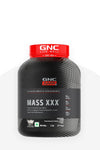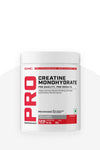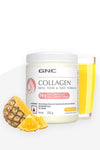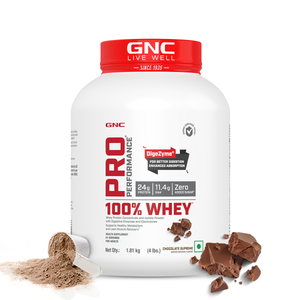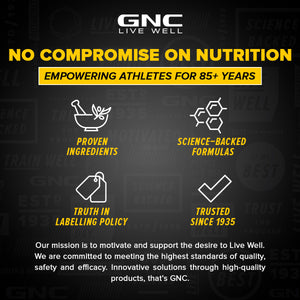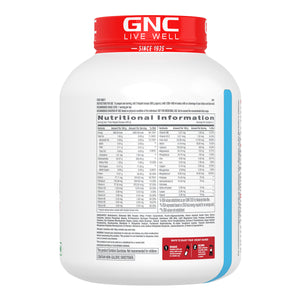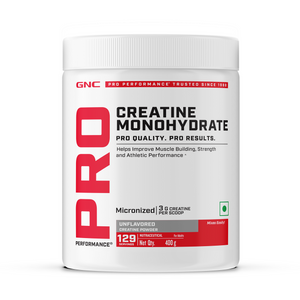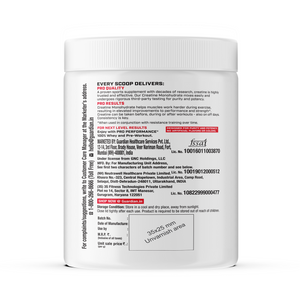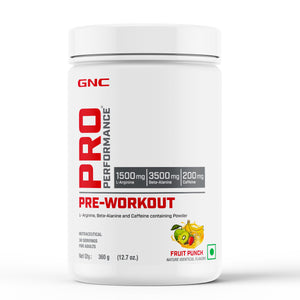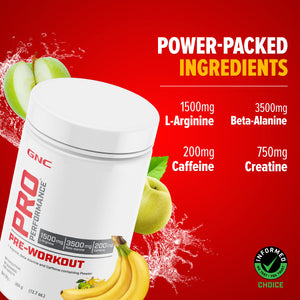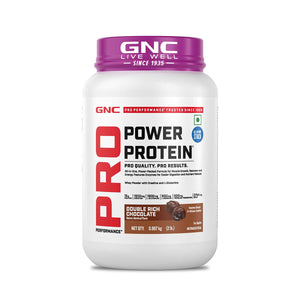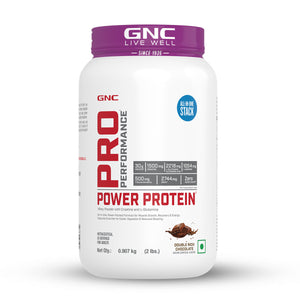This collection is empty
Continue shoppingWhat are protein supplements for teenagers?
Protein supplements for teenagers are products that provide an additional source of protein to their diet. They have a specialized formula that’s designed keeping in mind the nutritional needs of growing teenagers. Protein powders for teenagers typically contain whey, casein, soy, pea protein, or a blend of these. You can easily mix it with water or milk to make a smooth shake.
It's important to note that while protein supplements can have their benefits, they should not replace a well-rounded diet. Whole food sources of protein such as lean meats, poultry, fish, eggs, dairy products, legumes, nuts, and seeds provide a broader range of nutrients that supplements might lack. Before introducing protein supplements to a teenager's diet, it's recommended to consult with a healthcare professional or registered dietitian to determine if they are necessary and appropriate for the teenager's individual needs and goals.
Benefits of protein supplements for teenagers
The main benefits of protein supplements for teenagers are –
Support muscle growth and repair:
Protein is essential for building and repairing muscles, which is especially important for teenagers who are active or engaged in sports. Protein supplements can provide additional protein to support muscle recovery and growth after exercise.
Aid in Meeting Protein Needs:
Teenagers undergoing growth spurts may have higher protein requirements. Protein supplements can help ensure they meet their protein needs, especially if they struggle to consume enough protein from whole food sources.
Help in weight management:
Protein supplements, particularly those with lower calories and carbohydrates, can help teenagers feel full and satisfied, potentially aiding in weight management and preventing overeating.
Boost athletic performance:
Teenagers who are involved in competitive sports might benefit from protein supplements to aid in muscle recovery, repair, and overall performance enhancement.
Contribute to nutrient intake:
Protein for teenagers is fortified with vitamins and minerals, which can contribute to overall nutrient intake, especially if there are deficiencies in the teenager's diet.
Convenient to use:
Protein supplements can be a convenient way to increase protein intake, especially for busy teenagers who may have hectic schedules and find it challenging to consume enough protein-rich foods throughout the day.
Best GNC protein for teenagers
One of the best proteins for teenagers is GNC Milestones Teen Protein. It is specifically developed to meet the nutritional and fitness needs of young athletes striving to excel in sports and tournaments, it provides substantial support. This supplement delivers up to 30% of a teenager's daily protein requirements, fuelling their active lifestyle and fostering exceptional performance. Each serving of GNC's Teen Protein contains 12.5g of fast-absorbing Whey protein, accompanied by 1.5g of L-Glutamine and 0.2g of BCAAs. This combination ensures vital nourishment for your child's growth and athletic development, empowering them to unleash their full potential, particularly during the second growth-spurt phase.
It is formulated with premium-quality whey protein, L-Glutamine, BCAAs, and essential amino acids. GNC Teen Protein enhances muscle repair and recovery. It also supplies 100% RDA of vitamin D for proper calcium absorption and strong bones. The formula has magnesium which aids in maintaining healthy muscles while contributing to an athletic physique. GNC Teen Protein is also fortified with vitamins B1, B2, B3, and B9 to optimize food metabolism and maintain energy levels throughout the day. It also contains iron to enhance hemoglobin levels, facilitating efficient oxygen transport throughout the body. The formula incorporates sodium to maintain hydration and electrolyte balance, ensuring your teenager remains energetic and well-hydrated during training sessions.
To further enhance digestibility, GNC Teen Protein is enriched with DigeZyme, facilitating easy digestion and absorption of nutrients in the body. This special blend of gut-friendly enzymes including Alpha Amylase, Protease, Lipase, Cellulase, and Lactase forms a unique multi-enzyme complex that helps in easy digestion of protein for teenagers. GNC’s Teen Protein helps with digestion and also works great as a brain booster. It has the goodness of magnesium and 100% RDA of vitamin B12 which helps in enhancing concentration and prolongs attention span, which in turn allows your teenager’s mind to stay focused during training.
Best teenage protein supplements price list in India
| Best GNC teenage protein supplements | Quantity | Sale price |
|---|---|---|
| GNC Milestones Teen Protein | 750g | Rs. 1919 |
| *Sale prices mentioned on – August 31st 2023 and subject to change as per discounts and deals. | ||
Protein for teenager side effects
Although protein supplements for teenagers are completely safe to consume, just make sure to follow the dosage instructions. In some cases, there can be certain common side effects like –
- Nausea and vomiting
- Headache and wheezing
- Digestive issues – bloating, diarrhea, gas, constipation
- Stomach cramps
- Fever
- Redness, rashes, and itching
If you notice any of these signs and symptoms, stop giving your teenager the protein supplement and consult your doctor at the earliest. Make sure you read the ingredient list carefully and if your child is allergic to a particular ingredient, ask your doctor for an alternative.
When and how to consume protein for teenagers?
Read the instructions given on each pack to know the exact dosage details of the protein supplement. Usually, you need to mix the mentioned amount with water or milk to make a smooth shake. You can also blend the protein for teenagers with yogurt/ milk and fruits to make a healthy smoothie. Add it to various recipes like – waffles, homemade protein bars, muffins, etc. to give your child all the goodness of protein minus the guilt.
Where to buy the best protein for teenagers online?
Buy the entire range of GNC products including GNC protein for teenagers from GNC India’s official website – www.guardian.in You can read various customer reviews and ratings online before making the final purchase.
Why buy protein for teenagers from GNC India?
When you buy protein for teenagers directly from GNC India’s website, you get the promise of premium quality and 100% authentic products. Avail great deals and festive discounts and get your favorite GNC products delivered right to your doorstep.
Factors to consider before buying protein supplements for teenagers
Some of the most common factors to keep in mind before buying protein supplements for teenagers are –
Nutritional Needs:
Before considering protein supplements, assess whether the teenager's current diet provides sufficient protein intake. Most teenagers can meet their protein needs through regular meals, so supplements might not be necessary if their diet is balanced and includes protein-rich foods.
Age and Growth Stage:
Teenagers go through rapid growth and development, making proper nutrition essential. Younger teenagers may have different nutritional requirements compared to older ones. Consult with a pediatrician or registered dietitian to determine the specific protein needs based on the teenager's age and growth stage.
Physical Activity Level:
Consider the teenager's level of physical activity. Athletes or highly active teenagers may require more protein to support muscle growth and recovery. However, this can often be achieved through food sources rather than supplements.
Quality of Protein:
If you're considering a protein supplement, opt for high-quality sources. Whey, casein, egg whites, and plant-based protein powders (like pea, rice, or hemp) are good options. Make sure the supplement provides a complete amino acid profile.
Allergies and Sensitivities:
Check for any allergies or sensitivities the teenager might have, especially if considering dairy-based protein supplements. Read labels carefully to avoid potential allergens.
Frequently Asked Questions (FAQs)
1. Can I give protein supplements to my teenage child every day?
Yes, you can give protein supplements to your teenager every day if the doctor has recommended it. Assess your teenager's current dietary intake. If their diet already includes a variety of protein-rich foods such as lean meats, poultry, fish, dairy products, eggs, legumes, nuts, and seeds, they might be meeting their protein needs without supplements. Protein supplements should not be a substitute for whole food sources of nutrition. In case your teenager has special health goals like – muscle gain or wants to improve his/ her stamina for athletics and sports, then it would be best to consult your doctor and know the right amount of protein supplement for your teenage child.
2. How much protein do teenagers need every day?
The protein needs of teenagers can vary based on factors such as age, gender, activity level, and overall growth. The Recommended Dietary Allowance (RDA) for protein is –
Ages 14-18
- Boys: 52 grams per day
- Girls: 46 grams per day
It's important to remember that protein needs should be met primarily through whole food sources, such as lean meats, poultry, fish, dairy products, eggs, legumes, nuts, and seeds. These foods not only provide protein but also offer a wide range of essential nutrients that contribute to overall health.
3. Can my child get protein from natural sources? What are some good sources of protein that I can include in his/ her daily diet?
Yes, your teenager can get a good dose of protein from natural foods. Some of the protein-rich foods that you can include in their diet are –
Animal-Based Proteins –
- Chicken breast
- Turkey breast
- Fish (salmon, tuna, trout, etc.)
- Eggs
- Greek yogurt
- Cottage cheese
- Milk
Plant-based proteins –
- Lentils
- Chickpeas
- Black beans
- Kidney beans
- Tofu
- Tempeh
- Edamame
- Quinoa
- Chia seeds
- Hemp seeds
- Pumpkin seeds
- Almonds
- Peanuts
- Peanut butter (without added sugars)
Dairy and dairy alternatives
- Greek yogurt
- Cottage cheese
- Cheese (cheddar, mozzarella, etc.)
- Plant-based yogurt (made from almond, coconut, soy, etc.)
Whole grains
- Brown rice
- Whole wheat pasta
- Oats
- Barley
Seafood
- Shrimp
- Crab
- Lobster



